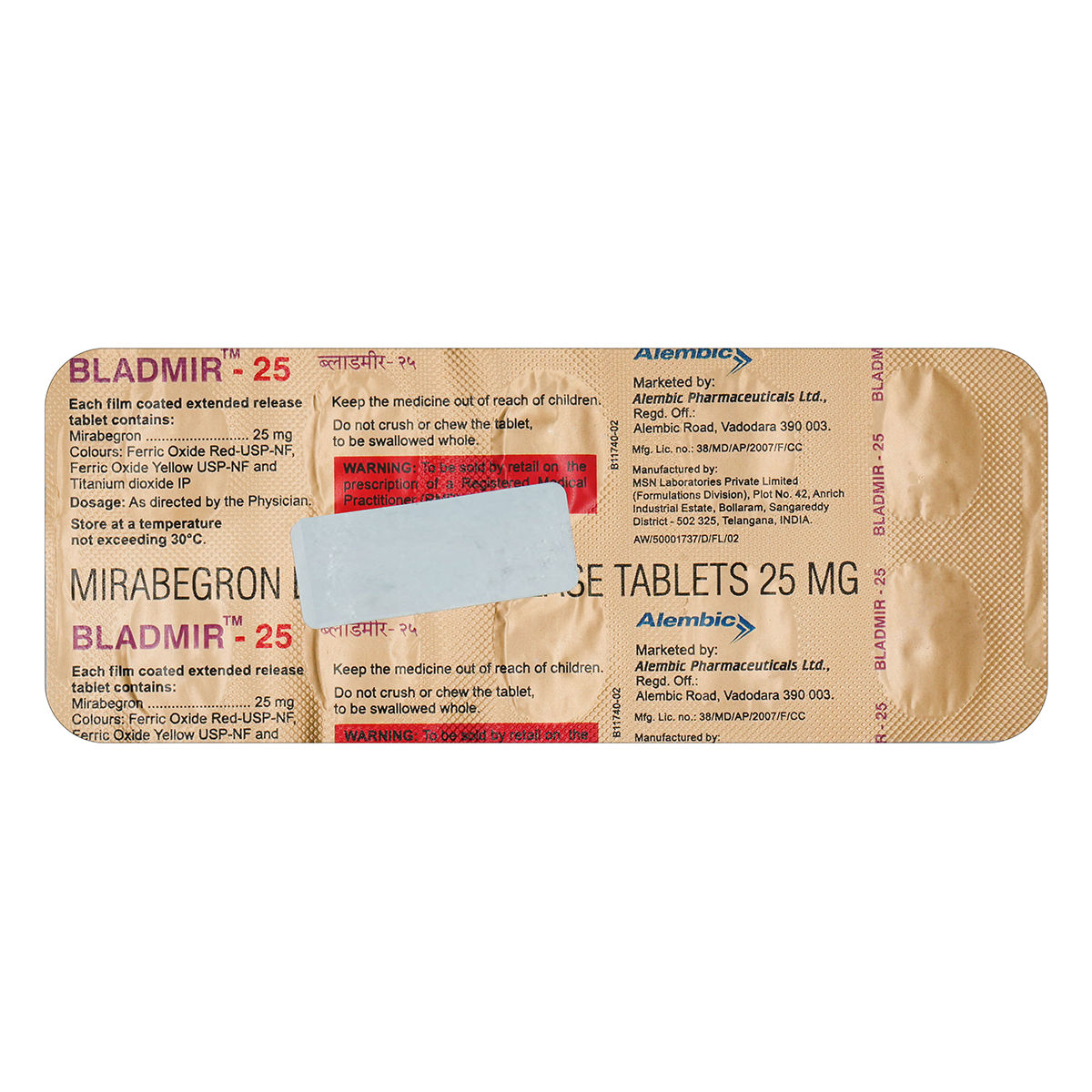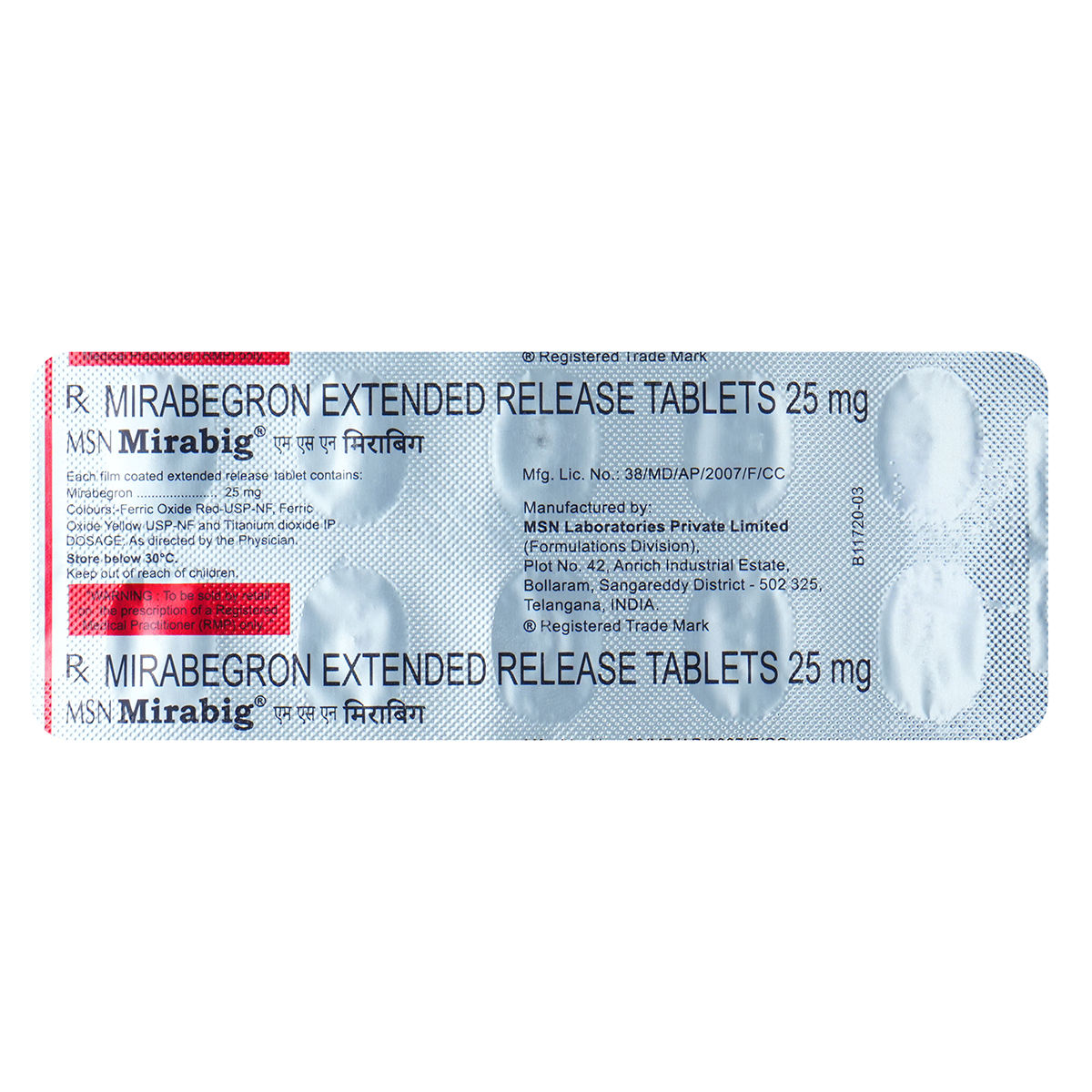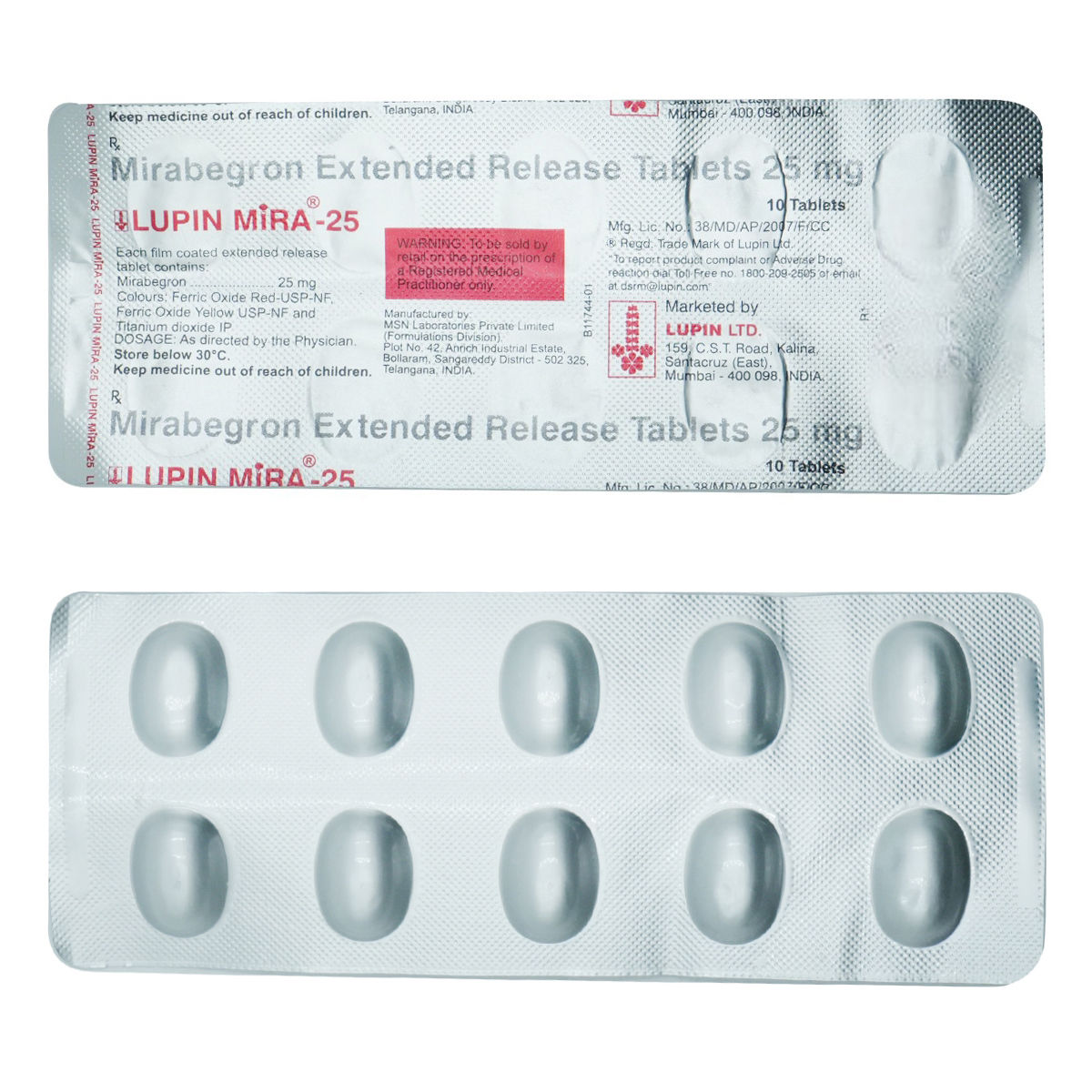Mirbeg 25 ER Tablet 10's
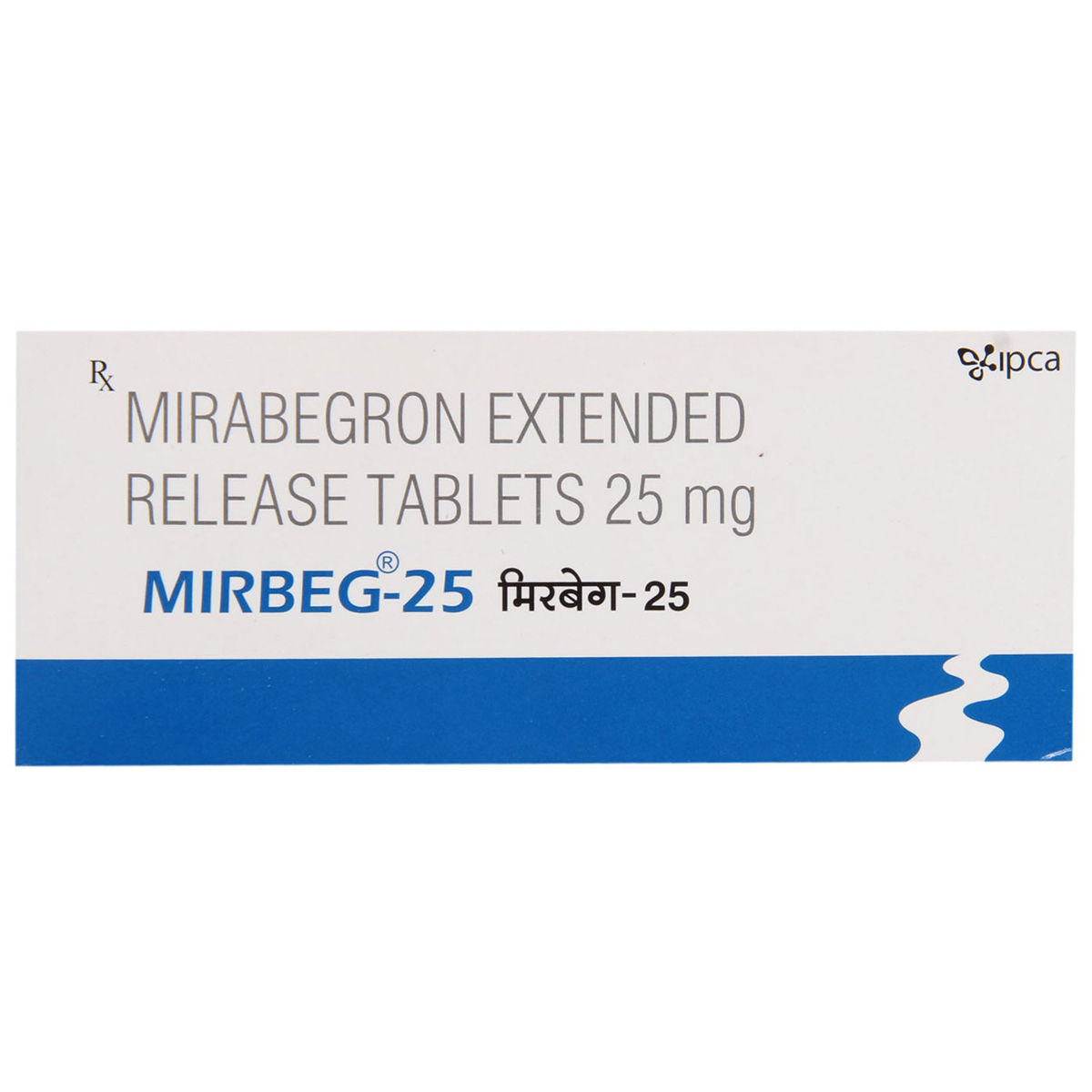
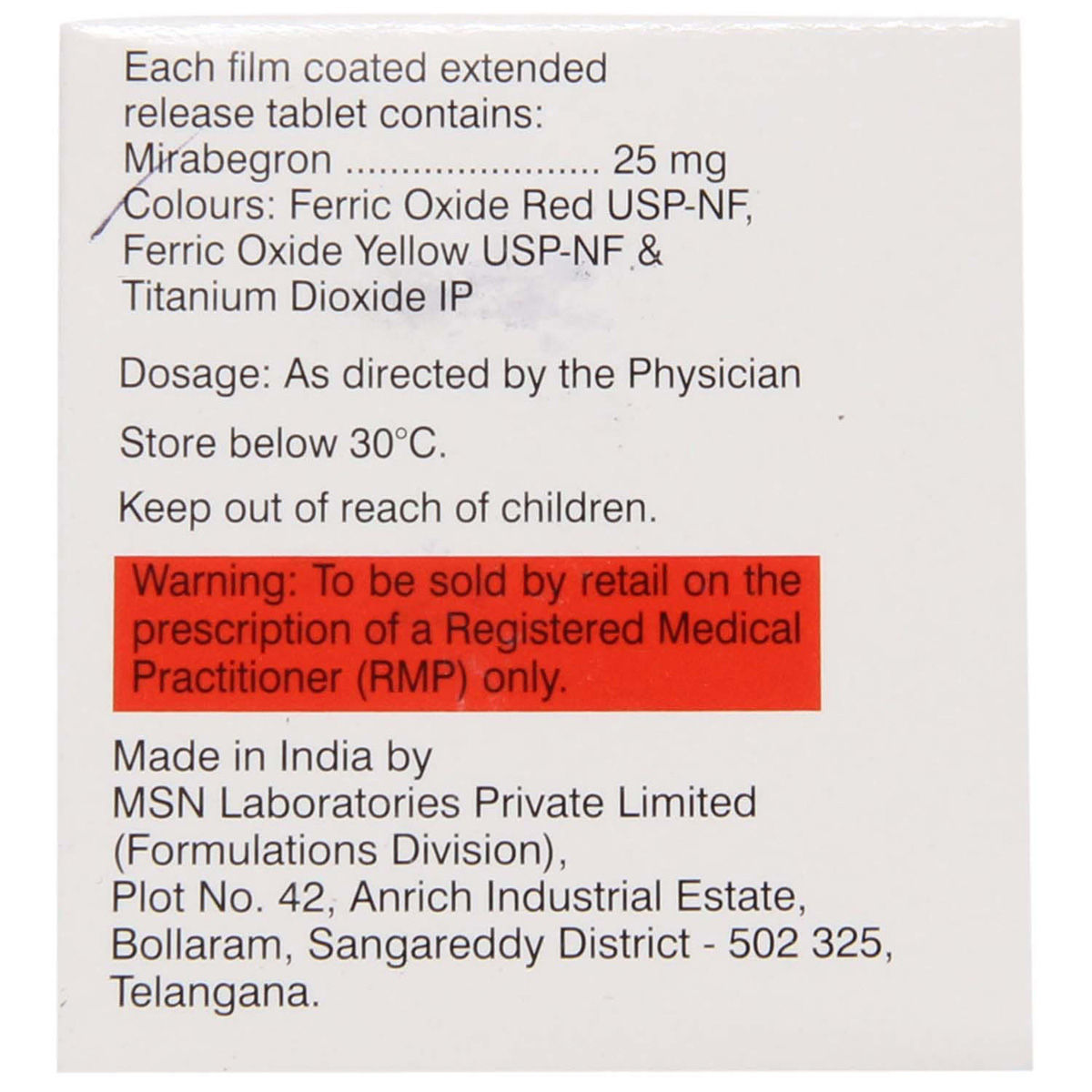
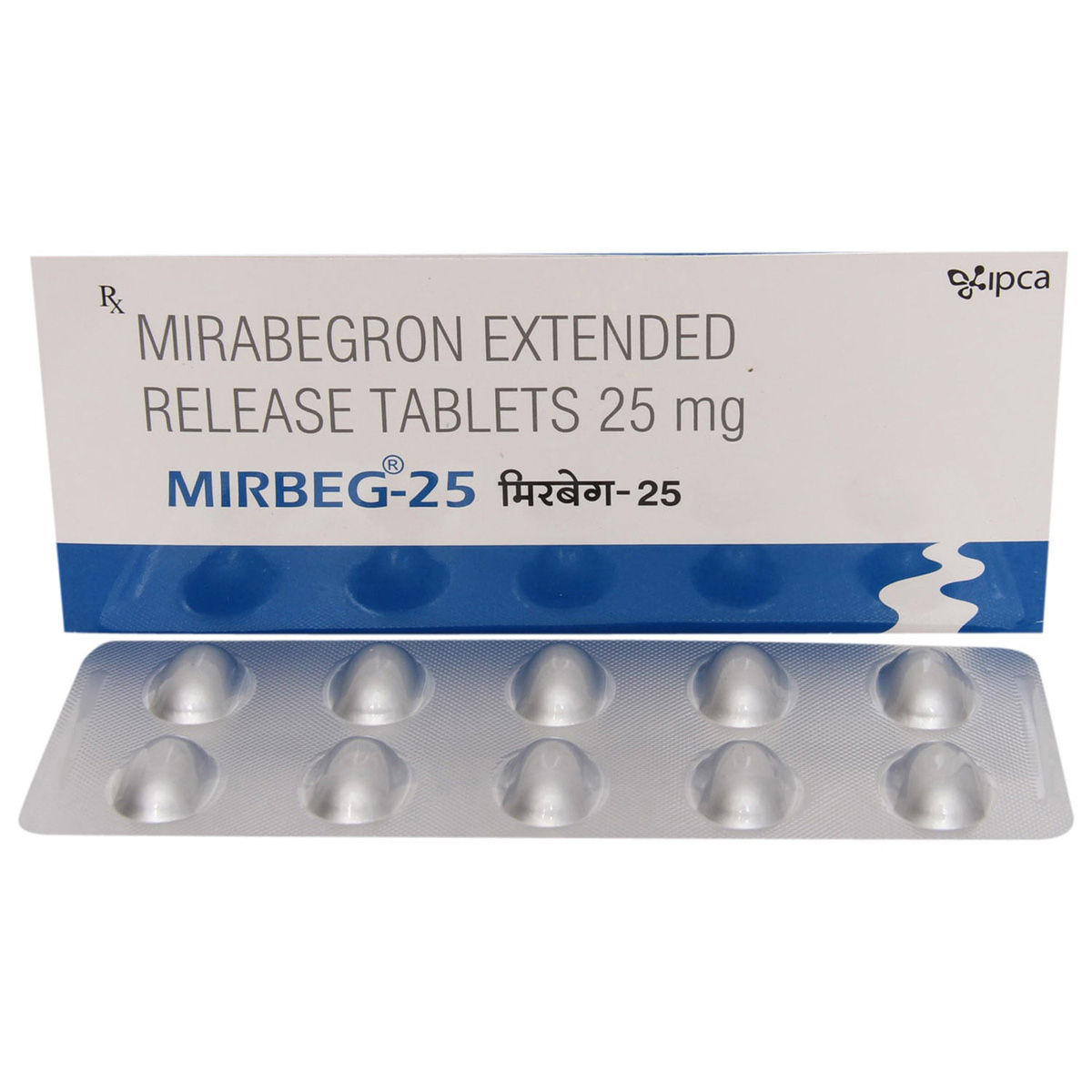
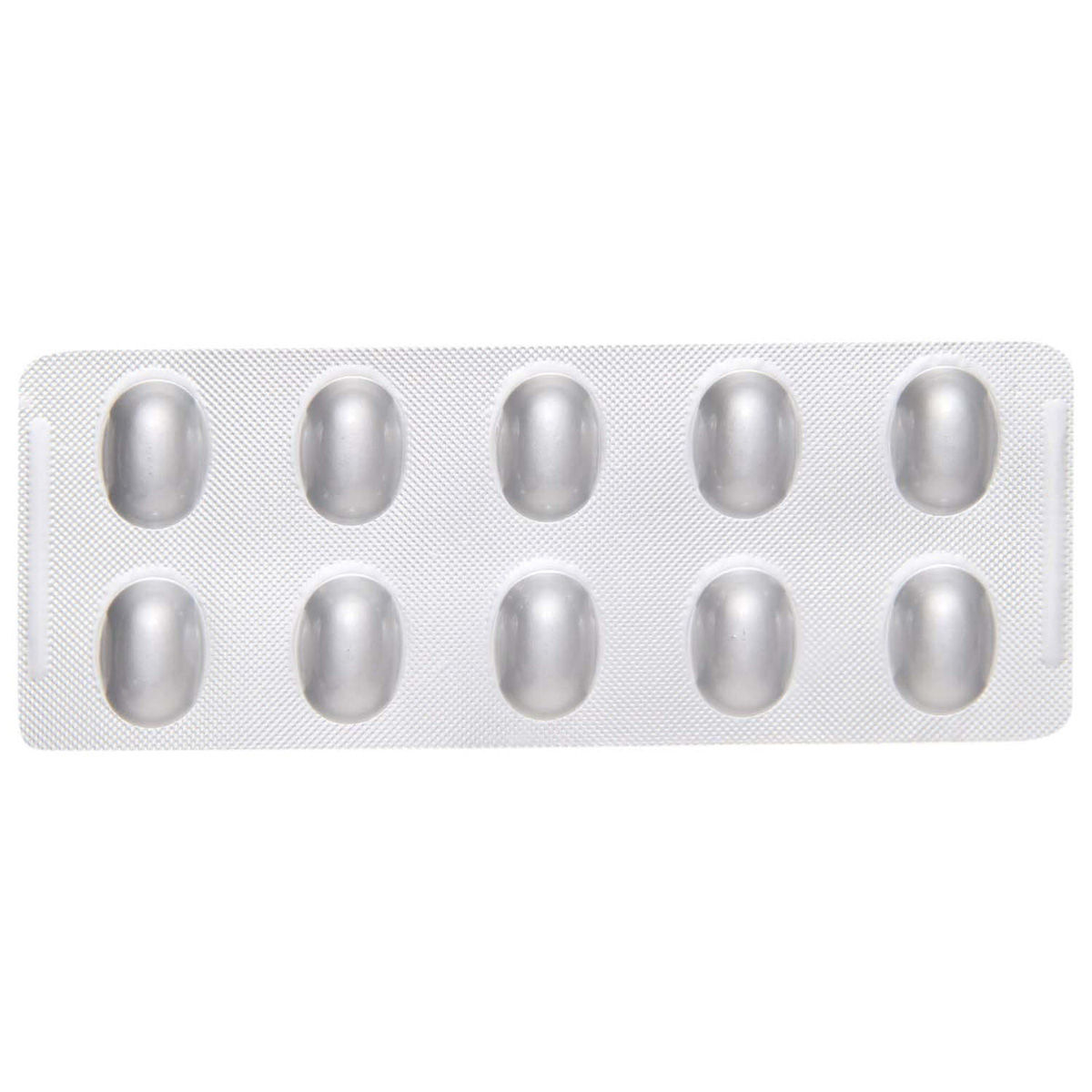
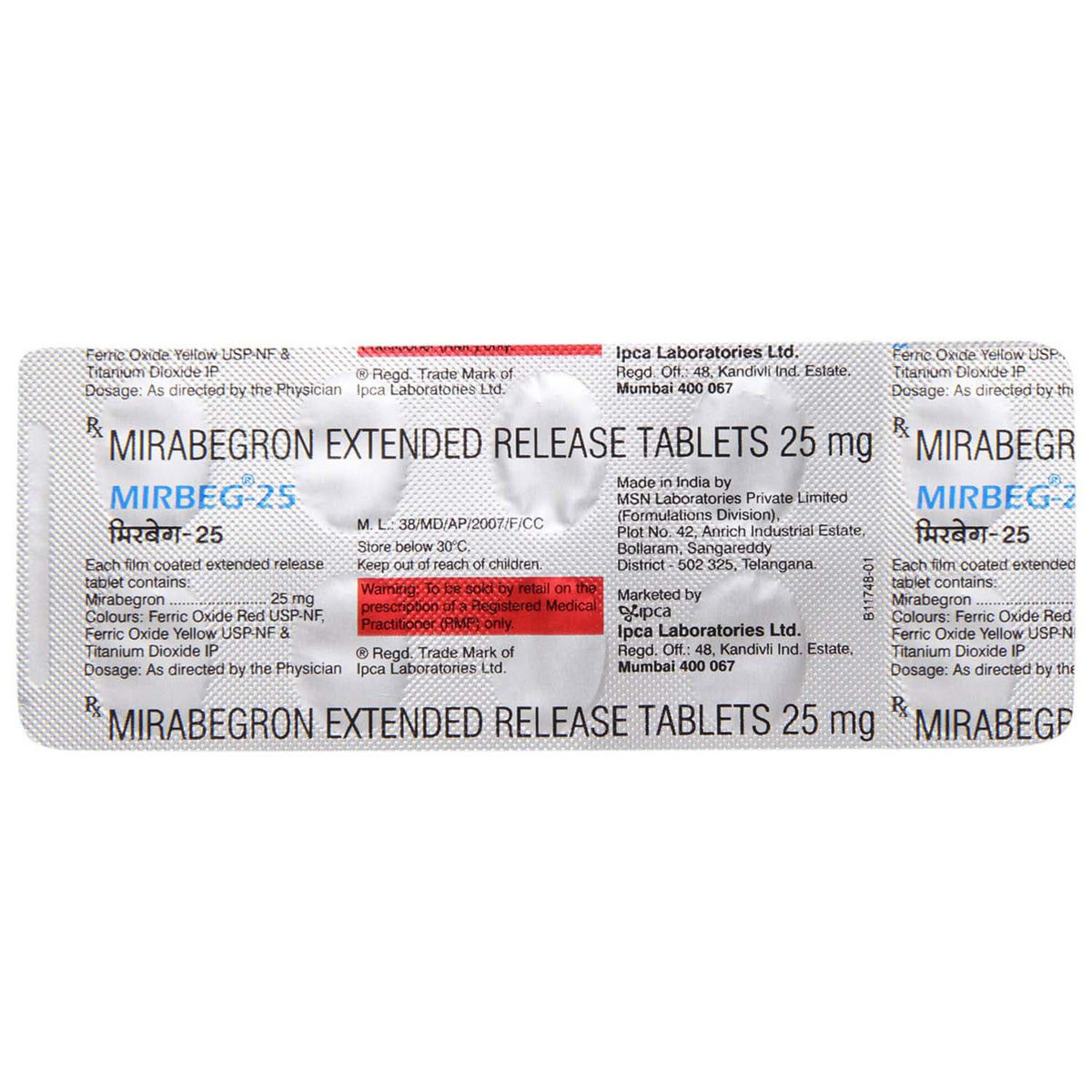
₹245.3*
MRP ₹272.5
10% off
₹231.62*
MRP ₹272.5
15% CB
₹40.88 cashback(15%)
Free Delivery
With Circle membership
(Inclusive of all Taxes)
This offer price is valid on orders above ₹800. Apply coupon PHARMA10/PHARMA18 (excluding restricted items)
Mirbeg 25 ER Tablet is used to treat overactive bladder. It contains Mirabegron,, which relaxes the muscles of the urinary bladder and decreases its activity. In some cases, this medicine may cause side effects such as nausea, constipation, diarrhoea, headache, dizziness, and increased heart rate. Inform the doctor if you are pregnant or breastfeeding, taking any other medication, or have any pre-existing medical conditions.
Know Your Delivery Time
Provide Delivery Location
Available Offers
 Prescription drug
Prescription drugWhats That

Secure Payment

India's Most Trusted Pharmacy

Genuine Products
Composition :
Manufacturer/Marketer :
Consume Type :
Return Policy :
Expires on or after :
About Mirbeg 25 ER Tablet
Mirbeg 25 ER Tablet belongs to the group of medications called ‘urinary antagonists' or 'antispasmodics' primarily used to treat overactive bladder (OAB) symptoms. Overactive bladder is a condition in which the urinary bladder muscles constrict uncontrollably, thereby causing an urgent need to urinate, frequent urination, and an inability to control urination.
Mirbeg 25 ER Tablet contains ‘mirabegron’ that relaxes the urinary bladder muscles, which in turn decreases the activity of the overactive bladder. In an overactive bladder, muscle contractions occur before the full expansion of the bladder, causing the patient to have frequent urges to urinate. Mirbeg 25 ER Tablet stops these sudden contractions of urinary bladder muscles, thereby enabling control over urination. Thus, it increases the amount and volume of urine that can be held by the bladder.
In some cases, Mirbeg 25 ER Tablet may cause common side effects of Mirbeg 25 ER Tablet , which are nausea, constipation, diarrhoea, headache, dizziness, and increased heart rate. Most of these side effects do not require medical attention and resolve gradually over time. However, if the side effects persist or worsen, consult a doctor.
Do not take Mirbeg 25 ER Tablet if you are allergic to any of its ingredients. Before taking Mirbeg 25 ER Tablet , inform your doctor if you have kidney disease, liver disease, hypertension, urinary retention, angioedema, or a history of heart rhythm problems (including QT prolongation). Consult your doctor if you are pregnant or breastfeeding. Avoid driving or operating heavy machinery, as this medicine may cause dizziness.
Uses of Mirbeg 25 ER Tablet
Directions for Use
Medicinal Benefits
Mirbeg 25 ER Tablet contains 'mirabegron', which belongs to the class of medications called 'anticholinergics'. It can decrease the activity of the overactive bladder. In an overactive bladder, muscle contractions occur before the full expansion of the bladder, causing the patient to have frequent urges to urinate. Mirbeg 25 ER Tablet can stop these sudden contractions of bladder muscles. It enables control over urination and increases the amount of urine held by your bladder.
How Mirbeg 25 ER Tablet Works
Storage
- Inform Your Doctor: Notify your doctor immediately about your diarrhoea symptoms. This allows them to adjust your medication or provide guidance on managing side effects.
- Stay Hydrated: Drink plenty of fluids to replace lost water and electrolytes. Choose water, clear broth, and electrolyte-rich drinks. Avoid carbonated or caffeinated beverages to effectively rehydrate your body.
- Follow a Bland Diet: Eat easy-to-digest foods to help firm up your stool and settle your stomach. Try incorporating bananas, rice, applesauce, toast, plain crackers, and boiled vegetables into your diet.
- Avoid Trigger Foods: Steer clear of foods that can worsen diarrhoea, such as spicy, fatty, or greasy foods, high-fibre foods, and dairy products (especially if you're lactose intolerant).
- Practice Good Hygiene: Maintain good hygiene to prevent the spread of infection. To stay healthy, wash your hands frequently, clean and disinfect surfaces regularly, and avoid exchanging personal belongings with others.
- Take Anti-Diarrheal Medications: If your doctor advises, anti-diarrheal medications such as loperamide might help manage diarrhoea symptoms. Always follow your doctor's directions.
- Keep track of your diarrhoea symptoms. If they don't get better or worse or are accompanied by severe stomach pain, blood, or dehydration signs (like extreme thirst or dark urine), seek medical help.
- Inform your doctor about the medication you're taking and the UTI symptoms you're experiencing.
- Your doctor may adjust your medication regimen or consider alternative medications or dosages that may reduce the risk of UTIs.
- Drink plenty of water (at least 8-10 glasses a day) to help flush out bacteria. Avoid sugary drinks and caffeine, which can exacerbate UTI symptoms.
- Urinate when you feel the need rather than holding it in. This can help prevent bacterial growth and reduce the risk of UTIs.
- Consider cranberry supplements: Cranberry supplements may help prevent UTIs by preventing bacterial adhesion.
- Monitor UTI symptoms and report any changes to your doctor.
- If antibiotics are prescribed, take them as directed and complete the full course.
- Hydrate your body: Drink enough water to prevent dehydration and headaches.
- Calm Your Mind: Deep breathing and meditation can help you relax and relieve stress.
- Rest and Recharge: Sleep for 7-8 hours to reduce headache triggers.
- Take rest: lie down in a quiet, dark environment.
- Cold or warm compresses can help reduce tension.
- Stay Upright: Maintain good posture to keep symptoms from getting worse.
- To treat headaches naturally, try acupuncture or massage therapy.
- Over-the-counter pain relievers include acetaminophen and ibuprofen.
- Prescription Assistance: Speak with your doctor about more substantial drug alternatives.
- Severe Headaches: Seek emergency medical assistance for sudden, severe headaches.
- Frequent Headaches: If you get reoccurring headaches, consult your doctor.
- Headaches with Symptoms: Seek medical attention if your headaches include fever, disorientation, or weakness.
- Inform your doctor about the symptoms you're experiencing due to medication.
- Your doctor may adjust your treatment plan, which could include changing your medication, adding new medications, or offering advice on managing your symptoms.
- Practice good hygiene, including frequent handwashing, avoiding close contact with others, and avoiding sharing utensils or personal items.
- Stay hydrated by drinking plenty of fluids to help loosen and clear mucus from your nose, throat, and airways.
- Get plenty of rest and engage in stress-reducing activities to help your body recover. If your symptoms don't subside or worsen, consult your doctor for further guidance.
- Please inform your doctor about joint pain symptoms, as they may adjust your medication regimen or prescribe additional medications to manage symptoms.
- Your doctor may prescribe common pain relievers if necessary to treat joint discomfort.
- Maintaining a healthy lifestyle is key to relieving joint discomfort. Regular exercise, such as low-impact sports like walking, cycling, or swimming, should be combined with a well-balanced diet. Aim for 7-8 hours of sleep per night to assist your body in repairing and rebuilding tissue.
- Applying heat or cold packs to the affected joint can help reduce pain and inflammation.
- Please track when joint pain occurs and any factors that may trigger it, and share this information with your doctor to help manage symptoms.
- If your joint pain is severe or prolonged, consult a doctor to rule out any underlying disorders that may require treatment.
- Contact your doctor immediately if you're experiencing a fast heart rate, palpitations, or other heart-related symptoms. This is crucial to determine whether the symptoms are related to your medication.
- Your doctor may need to adjust your medication regimen to alleviate the fast heart rate symptoms. This could involve changing the medication, reducing the dosage, or adding new medications to counteract the side effects.
- Follow your doctor's advice on monitoring your heart rate and blood pressure. This will help track any changes and ensure your heart rate returns normal.
- If you experience severe symptoms such as chest pain, dizziness, or shortness of breath, seek immediate medical attention. These symptoms can indicate a more serious condition that requires prompt treatment.
- Inform your doctor about dizziness symptoms. They may adjust your medication regimen or prescribe additional medications to manage symptoms.
- Follow your doctor's instructions for taking medication, and take it at the same time every day to minimize dizziness.
- When standing up, do so slowly and carefully to avoid sudden dizziness.
- Avoid making sudden movements, such as turning or bending quickly, which can exacerbate dizziness.
- Drink plenty of water throughout the day to stay hydrated and help alleviate dizziness symptoms.
- If you're feeling dizzy, sit or lie down and rest until the dizziness passes.
- Track when dizziness occurs and any factors that may trigger it, and share this information with your doctor to help manage symptoms.
What if I have taken an overdose of Mirbeg 25 ER Tablet
Drug Warnings
Do not take Mirbeg 25 ER Tablet if you are allergic to any ingredients present in it. Before taking Mirbeg 25 ER Tablet , inform your doctor if you have kidney disease, liver disease, hypertension, urinary retention, angioedema, or a history of heart rhythm problems (including QT prolongation). Consult your doctor if you are pregnant or breastfeeding. Avoid driving or operating heavy machinery, as this medicine may cause dizziness.
Drug-Drug Interactions
Drug-Drug Interactions
Login/Sign Up
Coadministration of Eliglustat and Mirbeg 25 ER Tablet can significantly increase the blood levels of eliglustat. This can increase the risk or severity of side effects.
How to manage the interaction:
Taking Mirbeg 25 ER Tablet with Eliglustat is not recommended, it should be taken only when advised by a doctor. You should seek immediate medical help if you develop symptoms like sudden dizziness, lightheadedness, fainting, shortness of breath, irregular heart rate, weak pulse, or heart palpitations. Do not discontinue any medications without a doctor's advice.
Combined use of Mirbeg 25 ER Tablet and Pimozide may increase the level of pimozide in the blood. This can increase the risk or severity of irregular heart rhythms.
How to manage the interaction:
Taking Mirbeg 25 ER Tablet and Pimozide may lead to an interaction but they can be taken together if your doctor has prescribed them. However, if you experience drowsiness, blurred vision, dry mouth, constipation, low blood pressure, tremors, trembling of hands, arms, legs, jaw and face, balance and Speech difficulty, or abnormal muscle movements consult a doctor. Do not discontinue any medications without consulting a doctor.
A combined use of Mirbeg 25 ER Tablet and Brexpiprazole may increase the level of Brexpiprazole in blood. This can increase the risk or severity of side effects.
How to manage the interaction:
There could be a possible interaction between Mirbeg 25 ER Tablet and Brexpipraole, it can be taken together if your doctor has advised them. However, if you experience drowsiness, fatigue, seizure, chest pain or tightness, irregular heart rates, fever, excessive sweating, shivering or shaking, blurred vision, muscle spasm or stiffness, tremors, incoordination, stomach cramp, nausea, vomiting, and diarrhea contact a doctor immediately. Do not discontinue any medications without consulting a doctor.
Combine use of Mirbeg 25 ER Tablet and thioridazine may raise the blood levels of thioridazine. This can increase the risk or severity of side effects.
How to manage the interaction:
Taking Mirbeg 25 ER Tablet and thioridazine together can possibly result in an interaction, it can be taken if your doctor has advised it. However, if you experience stomach pain, diarrhea, dehydration, sudden dizziness, lightheadedness, fainting, shortness of breath, or rapid heartbeat, contact a doctor immediately. Do not discontinue any medications without consulting a doctor.
Coadministration of Mirbeg 25 ER Tablet and Venetoclax may significantly increase the blood levels and effects of Venetoclax. This can increase the risk or severity of side effects.
How to manage the interaction:
There may be a possible interaction between Mirbeg 25 ER Tablet and Venetoclax, but they can be taken together if your doctor has prescribed them. However, if you experience nausea, vomiting, diarrhea, fatigue, fever, chills, bleeding problems, sudden dizziness, lightheadedness, fainting, shortness of breath, or rapid heartbeat, contact a doctor immediately. Do not discontinue any medications without consulting a doctor.
Coadministration of Mirbeg 25 ER Tablet and Tamoxifen may reduce the effects of tamoxifen.
How to manage the interaction:
Taking Mirbeg 25 ER Tablet and Tamoxifen together can possibly result in an interaction, it can be taken if your doctor has advised it. However, if you experience painful urination, constipation, dry mouth, headache, sudden dizziness, lightheadedness, fainting, shortness of breath, or rapid heartbeat, contact a doctor immediately. Do not discontinue any medications without consulting a doctor.
Combining Aripiprazole with Mirbeg 25 ER Tablet can increase the levels of Aripiprazole in the body. This can lead to increased risk or severity of side effects.
How to manage the interaction:
Although taking Mirbeg 25 ER Tablet and Aripiprazole together can cause an interaction, it can be taken if a doctor has suggested it. If you notice any of these signs like feeling sleepy, having seizures, unusual muscle movements, low blood pressure, feeling confused, muscle spasms, twitching in your jaw, shaking or jerking in your arms and legs, feeling nervous or restless, dizziness, lightheaded, or fainting contact the doctor right away. Do not stop using any medications without a doctor's advice.
Drug-Food Interactions
Drug-Food Interactions
Login/Sign Up
Frozen Meals, Cheese, Red Meat, Potato Chips, Hamburgers, Hot Dogs, Ice Cream
How to manage the interaction:
Taking Mirbeg 25 ER Tablet with High fat Food can reduce the oral absorption of Mirbeg 25 ER Tablet. Avoid high fat food while being treated with Mirbeg 25 ER Tablet.
Diet & Lifestyle Advise
- Eat fresh fruits like pears, bananas, citrus fruits, and vegetables like beans and potatoes.
- Try to take cranberry juice as it helps in minimizing urinary infections.
- Avoid coffee, tea, and carbonated drinks which contain caffeine.
- Do not consume processed, fried, or spicy foods, as these can irritate your bladder.
- Limit alcohol intake as it can increase the risk of side effects.
- Quit smoking and exercise regularly.
Habit Forming
Therapeutic Class
Mirbeg 25 ER Tablet Substitute

Mirago 25 Tablet 10's
by AYUR
₹23.58per tabletBladmir 25 Tablet 10's
by AYUR
₹27.05per tabletMirakem 25 ER Tablet 10's
by AYUR
₹26.10per tabletMirabig 25 ER Tablet 10's
by AYUR
₹24.75per tabletLupin Mira 25 Tablet 10's
by AYUR
₹34.70per tablet
Product Substitutes
Alcohol
Caution
Avoid taking alcohol as it increases the risk of side effects.
Pregnancy
Caution
Mirbeg 25 ER Tablet is not recommended for use in pregnant women unless absolutely necessary. Before taking this medicine, the risks and benefits should be discussed with the doctor.
Breast Feeding
Caution
Mirbeg 25 ER Tablet is not recommended for use in breastfeeding women unless absolutely necessary. Before taking this medicine, the risks and benefits should be discussed with the doctor. If this medicine is used, close monitoring of the infant for undesired side effects is recommended.
Driving
Caution
The use of this medicine may cause blurred vision or dizziness in some patients. You are advised not to perform any activities, such as driving a vehicle or operating machinery, if you experience any of these symptoms during treatment with this medicine.
Liver
Caution
Mirbeg 25 ER Tablet should be used with caution in patients with severe liver disease. A dose adjustment of Mirbeg 25 ER Tablet may be needed. Please consult your doctor. Mirbeg 25 ER Tablet is not recommended for use in patients with severe liver disease.
Kidney
Caution
Mirbeg 25 ER Tablet should be used with caution in patients with kidney disease. A dose adjustment of Mirbeg 25 ER Tablet may be needed. Please consult your doctor.
Children
Caution
Mirbeg 25 ER Tablet should not be used in children below 12 years of age unless prescribed by a doctor.
FAQs
Mirbeg 25 ER Tablet belongs to the group of medications called ‘urinary antagonists' or 'antispasmodics' primarily used in the treatment of overactive bladder (OAB) symptoms.
Mirbeg 25 ER Tablet prevents sudden bladder muscle contractions and increases the volume and amount of urine the bladder can hold. Thus, Mirbeg 25 ER Tablet helps to control the release of urine and helps reduce symptoms of OAB like a strong urge to urinate, frequent urination and reduced urine flow.
If you have kidney disease, liver disease, hypertension, urinary retention, angioedema, history of heart rhythm problems (including QT prolongation), please contact a doctor before taking Mirbeg 25 ER Tablet .
Ketoconazole is an antifungal medicine, and it may interact with Mirbeg 25 ER Tablet . So, inform your doctor about all the prescription and non-prescription medicines before taking Mirbeg 25 ER Tablet to avoid unwanted effects.
Mirbeg 25 ER Tablet should be used with caution in patients with high blood pressure due to the increased risk of worsening the patient's condition. It is not recommended for use in patients with severe uncontrolled hypertension. Regular blood pressure monitoring, appropriate dose adjustments or replacement with a suitable alternative may be required in some cases based on the clinical condition.
Mirbeg 25 ER Tablet may cause side effects such as nausea, headache, diarrhoea, constipation, increased heart rate and dizziness. If these side effects persist or worsen, please consult your doctor.
No, Mirbeg 25 ER Tablet is not recommended for children as the safety and effectiveness were not established.
No, Mirbeg 25 ER Tablet is not known to cause an addiction. However, it should be taken in the dose and for duration as prescribed by your doctor.
Mirbeg 25 ER Tablet should be taken for as long as it is advised by the doctor. Follow all the instructions and do not discontinue taking Mirbeg 25 ER Tablet on your own.
It might take 8 weeks or more for Mirbeg 25 ER Tablet to show its full benefits. After 4 to 8 weeks, the dosage might be increased based on how well the medicine suits and affects the patient.
No, do not stop taking Mirbeg 25 ER Tablet even if you start feeling better as it does not cure overactive bladder but relieves the symptoms of urgency, frequency and incontinence (unable to control when you empty your bladder). Discontinuing Mirbeg 25 ER Tablet may result in a recurrence of the overactive bladder symptoms.
No, Mirbeg 25 ER Tablet does not affect sleep. However, if you have any sleep related problems, consult your doctor.
No, you are recommended to take Mirbeg 25 ER Tablet daily as advised by your doctor as it controls your condition and does not cure it. Since your bladder takes time to adapt to the medicine, if you take it off and on, you will not get the desired benefits and your symptoms will recur.
Mirbeg 25 ER Tablet may cause side effects such as infection of kidneys, urinary bladder, ureters, or urethra but does not affect everyone. Mirbeg 25 ER Tablet has been associated with very few reports of developing bladder pain and kidney stones. Also, patients with compromised kidney function should be careful while using Mirbeg 25 ER Tablet and in case of any unwanted symptoms related to kidneys, inform your doctor.
If you accidentally take more than the required dose of Mirbeg 25 ER Tablet , seek medical help immediately even if you do not feel any discomfort. Overdose of Mirbeg 25 ER Tablet may increase your blood pressure and pulse rate resulting in severe headache, chest pain, palpitations and fatigue.
Country of origin
Manufacturer/Marketer address
Customers Also Bought
Disclaimer
Author Details
We provide you with authentic, trustworthy and relevant information
Reference
- https://www.medicines.org.uk/emc/product/2977/smpc#PRODUCTINFO
- https://www.medicinenet.com/mirabegron/article.htm
- https://www.mims.com/malaysia/drug/info/mirabegron?mtype=generic
- https://www.webmd.com/drugs/2/drug-162243/myrbetriq-oral/details
- https://www.drugs.com/cdi/mirabegron.html
- https://www.accessdata.fda.gov/drugsatfda_docs/label/2018/202611s011lbl.pdf
Recommended for a 30-day course: 3 Strips













